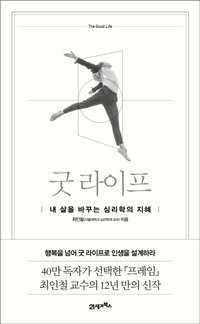Books | The Good Life by Choi Incheol (2018)
20-02-10 16:06페이지 정보
작성자 관리자 작성일20-02-10 16:06 조회2,644회 댓글0건관련링크
본문

| Title |
The Good Life (2018)
(Published in Korean by Choi Incheol in 2018)
| Recommendation |
On August 31, I went to a seminar for an ongoing research project being conducted jointly by SNU’s Center for Happiness Studies and its Institute of Health & Environment. The topic of the seminar, which related to embitterment and social justice, attracted a big audience, and the liveliness of the question-and-answer session was memorable. The speaker , a doctor of neuropsychiatry, said in his presentation that medication can do little to treat emotions like anger and a desire for revenge, and during the Q&A, a graduate student asked if the doctor was starting from the assumption that getting revenge should not be an option. The incident reminded me that new questions come out of differences in perspective and thinking.
Professor Choi Incheol of the Dept. of Psychology is the current head of the Center for Happiness Studies and part of the team conducting that joint research product. In his new book The Good Life [available only in Korean], he argues that the state of happiness can measured by the relative proportions of negative and positive emotions a person is feeling, and that people are happy when they have more positive than negative emotional experiences. He also emphasizes repeatedly that happiness is not a single, momentary emotion but many good emotions and a good life. The book is very helpful to readers in that it points out misunderstandings that we have about happiness and suggests conditions (or activities) that make it possible for people to lead truly happy lives.
One part of the book that really stuck with me was about the section of the UN’s World Happiness Report that analyzes happiness among immigrants. Because immigrants are people who have left their home country in search of a better life, determining whether they are living happy lives has a different meaning than it does for other groups. According to the report, immigrants feel the same level of happiness as the natives of the country in which they’ve settled. This reflects some of the impact of living in a society that enjoys a high quality of life, and suggests that improving quality of life is possible when individuals and society work together.
I also found The Good Life’s division of happy people into “psychology-focused” and “environment-focused” people interesting. Psychology-focused people tend to reinterpret their various experiences in a positive light and believe that happiness depends on your mindset, while environment-focused people create situations in which they can experience happiness. Which sounds more like you? If you often feel that you are unhappy, I recommend looking into the advice Professor Choi gives in this book, based as it is on many years of research, in order to find a new definition of happiness.
댓글목록
등록된 댓글이 없습니다.